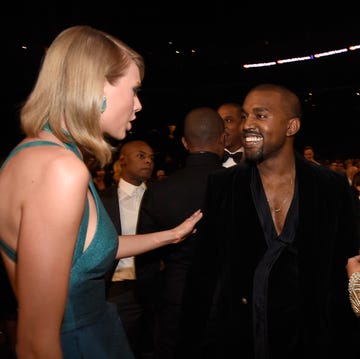Happy Birthday, mansplainers! You are officially 10 years old, and I am the last feminist left on earth who is still charmed by your existence.
Maybe this is not literally true (if so, please do power up the old Twitter account and mansplain the rhetorical uses of hyperbole to me), but it does seem that the term has fallen into some disrepute. It was intended to refer to the act of a man explaining something to a woman that she already knows.
The most famous example dates back to 2008, when Rebecca Solnit wrote “Men Explain Things to Me,” in which she recounted how a man at a party aggressively explained a recent book about Eadweard Muybridge to her, while she tried in vain to tell him that she had in fact written that book. More recently, the writer Dana Schwartz met a man who was eager to teach her about the Twitter account @GuyInYourMFA—with the caveat that “it's really something you can only relate to as a male writer"—which, of course, Schwartz actually runs.
These days, “mansplain” has a more elastic definition. It includes the times when men tell an expert about her job, as in the above cases, or the moments when men just talk about things they clearly don’t understand. (See: the account “Men React to Cat Person,” a feed devoted to men’s responses to the female sexual experience in the viral New Yorker short story of the same name). And sometimes, it can mean what happens when men explain anything to women, or men talk to women, or just men who talk, about anything, to anyone, ever.
But that broadened scope has provoked some ire. "The only thing I hate more than the word ‘mansplain’ is the phenomenon. But I really, really despise the word," complained the excellent Alexandra Petri at The Washington Post in 2014. Around that time, Benjamin Hart at Salon declared that overuse had “killed” the word: “Any word whose etymology encompasses half of all humanity is begging, by nature, to be misappropriated,” he declared. “It’s far easier to tar someone with a charged, one-size-fits-all putdown than to engage with the point they’re trying to make.” And user Barry Purcell at Quora has alleged that while “[o]riginally, ‘mansplaining’ had a useful function. It was specifically for when a man would ‘talk over’ or ‘correct’ or ‘dismiss’ a woman’s personal experience.... Now, it’s been made totally worthless by roaming gangs of idiotic feminists who don’t understand it. And if you try to explain where they’re going wrong—guess what!” Thank you, Barry.
Whether or not you think men should get to ban a word intended to describe their own grievous, uniquely male behavior, “mansplaining” does feel a little dated; a relic from the snappy, sunny Internet activism at the beginning of the Obama administration, when feminists could afford to communicate in cute neologisms and buy ironic “Male Tears” mugs because we were not yet in a permanent state of crisis.
Back then, in the words of writer Kat Stoeffel, “misandry was the coin of the feminist-internet realm and, to me, eye-rolling felt more persuasive than shrill political correctness.” The election of Donald Trump and the emergence of the alt-right has made it clear that misogyny is a far more serious problem than many of us supposed. As anti-woman sentiment seems to increasingly take the form of violent mobs online and off, Stoeffel wonders whether "we feminists set ourselves up for this…by talking among ourselves about who should sit down and the taste of male tears, at the expense of addressing the substance of anti-feminist arguments?”
These are good questions, and I’m thankful to Stoeffel for womansplaining them. Yet, if I may splain, nothing makes my heart soar like the reaction caused by a well-timed accusation of “mansplaining.” What matters to me isn’t whether the term is used in for its initial purpose, but that fact that almost every time I've seen it deployed, it provokes the kind of intense, aggressive reaction from the man accused of it that seems to prove its very point.
The first documented instance of a man freaking out about the term is instructive and was in fact recently unearthed. (Lexicographers, you do good work.) The fight occurred on LiveJournal in August 2008, when the presumptively male “count-vronsky” overstepped his bounds by telling “electricwitch” that a piece of art represented, among other things, “an absurdist comment on woman’s maternal role as food provider[.]”
“Wow, thank you so much for mansplaining this art to me!” electricwitch responded. “What with my arts degrees, I can’t understand it at all!”
And in a manner Internet Men have been emulating ever since, count-vronsky then demonstrated just why women wanted him to shut up:
“I am duly chastened e-witch, and grieved to have offended your petty but obviously sincere gender politics, but I meant no harm,” he began, “Why is it ‘mansplaining’ and not me just having a difference of opinion and expressing it to you? I mean does everything, even an innocuous comment—an expression of appreciation for a piece of art—have to be seen through the lens of your feminist principles?”
I admit that it is immature (and possibly even cruel) to find the baffled, wounded, un-self-aware sexism in this response hilarious. But I also can’t stop laughing.
Critics claim that the popular usage of “mansplain” works more to troll sexist men than to illuminate the problems with their arguments and that to call someone a mansplainer is to simply tell them to shut up, albeit with a feminist tilt. To a certain extent, this is true. But this is feminist work! Because what we really mean when we tell someone he's mansplaining is that he's taking up too much space, too much air; that he values his own contributions more than he can consider what a woman might have to offer.
The unearned "expertise" of a mansplainer, obliviously barging into conversations, carrying on monologues about things he knows nothing about, and dropping important facts and opinions on people whose interest level or knowledge he hasn’t even bothered to ascertain, is at complete odds with how women are taught to carry on conversations. And, whereas we tend to tell women to speak more like men if they want to be taken seriously, the word “mansplain” throws it back on the men in the equation, asking them to consider that it might be better to take some cues from women.
All that—and it makes men just lose it on the Internet. Which is, I would think, a positive development. It’s a sign that men have been challenged, that they’ve been pushed to think about themselves and their behavior in a new and uncomfortable way. If we’re trolling men when we call them “mansplainers,” we’re trolling them toward their better natures! If those men slink back to red pill Reddit after one interaction, the fault lies with them, not with the woman who can’t bear to hear yet another man explain why Die Hard is a Christmas movie.
Maybe I’m making too much out of what is in the end just a way to embarrass or irritate men. To quote a great man(splainer), does everything have to be seen through the lens of my feminist principles?
Well, first of all: Yes, it does. But conversation—who gets to talk, what they get to say, and how seriously we listen to them—has always been political. It doesn’t matter if women have used “mansplain” too much, or if they always use it in the most correct sense of the word. (I pity the fool who mansplains a woman’s use of the word “mansplain” to her.) What matters is that the word gives women a tool to disrupt and challenge bad, stale, or sexist conversations. I mean, thanks to the still-enormous number of mansplainers out there, it’s rare that women get a chance to talk at all. If we do get a word in edgewise, we should make it count.













